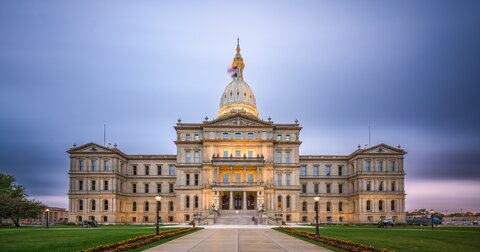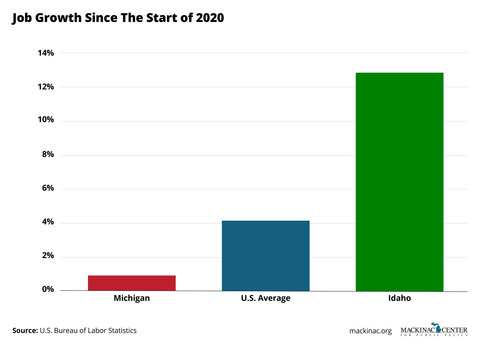Michigan House OKs tax breaks for data centers
Opponents cite fiscal, environmental costs of handout that could exceed $90M
Michigan taxpayers will subsidize data centers that use millions of gallons of water each day if the state enacts a bill that narrowly passed the House Wednesday.
The Michigan House approved Senate Bill 237 on a vote of 56-41. The bill exempts data center equipment and enterprise data center uses from the use tax. The exemption could be a windfall for data centers that use large water supplies in their operations.
The tax break would continue until 2050, and in some cases, 2065. The Senate Fiscal Agency said large data centers can consume anywhere from one million to five million gallons of water per day.
The bill would reduce state and local revenue by an unknown amount. The reduction would be at least $52.5 million through fiscal year 2065-66, but that figure depends on many factors and could exceed $90 million.
The bill would require a total capital investment of $250 million for a facility located on a brownfield plan. A qualifying facility would also have to create at least 30 new jobs with an annual wage equal to 150% or more of the region’s median wage through Dec. 31, 2050.
The House failed to pass a similar measure, House Bill 4906, that would have given data centers a break on sales taxes as well.
The bill will give companies tax breaks while allowing water and electricity costs to be passed onto ratepayers, a policy associate with the Michigan Environmental Justice Coalition told Michigan Capitol Confidential in an email.
“These bills continue a failed trend of tax subsidies for big corporations as a substitute for real investment in our communities, and they include clear loopholes allowing significant costs to be passed along to ordinary ratepayers,” Chris Gilmer-Hill wrote. “Michigan needs forward-facing investments in our communities and protections for our clean air and water, not big-tech tax handouts that sacrifice the wellbeing of our most vulnerable communities for no real benefit to working Michiganders.”
Worldwide, data centers consume about 3% of the world's total electric supply and produce 2% of the world's greenhouse gas emissions, according to Senate analysts.
Michigan’s residential electricity rates are the highest in the Midwest at 19.66 cents per kilowatt hour, according to the U.S. Energy Information Administration.
A data center would be welcome if its owner paid for power and water usage, John Mozena, president of the Center for Economic Accountability, told CapCon in an email, but the state should not subsidize data centers that provide little economic benefit.
“At a time when the state is grappling with the question of how we keep the lights on despite an aging fleet of power plants and how we make sure that the water in homes and schools across the state is clean and safe, it’s obscene for our government to be throwing millions of dollars at corporations that are perfectly capable of paying their own way,” Mozena wrote.
Michigan Capitol Confidential is the news source produced by the Mackinac Center for Public Policy. Michigan Capitol Confidential reports with a free-market news perspective.


 EGLE flap leaves 150,000 tons of waste headed for Michigan landfills
EGLE flap leaves 150,000 tons of waste headed for Michigan landfills
 Consumers Energy requests another rate hike one week after approval of $154 million increase
Consumers Energy requests another rate hike one week after approval of $154 million increase
 Green burial site a grave concern for Michigan township
Green burial site a grave concern for Michigan township


 Employment decline leaves Michigan near the bottom nationwide
Employment decline leaves Michigan near the bottom nationwide
 Whitmer makes untrue claims about Michigan’s job recovery
Whitmer makes untrue claims about Michigan’s job recovery
 Whitmer touts 38,000 jobs ‘announced’ but not created
Whitmer touts 38,000 jobs ‘announced’ but not created